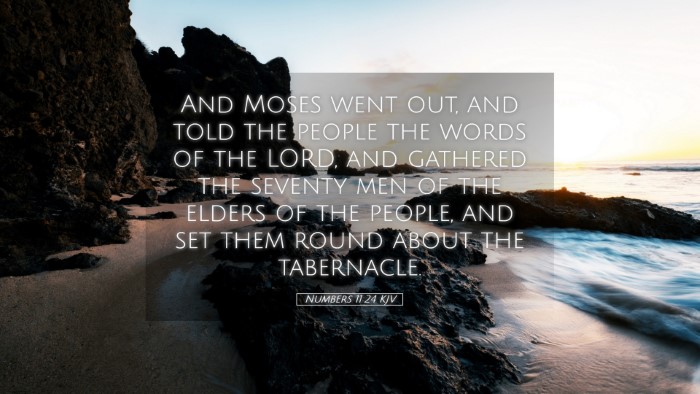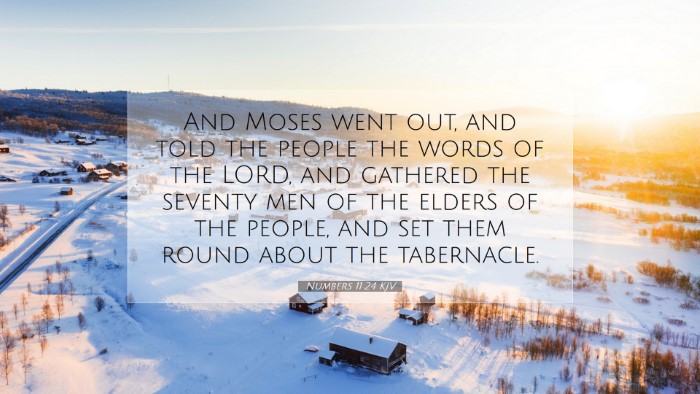Commentary on Numbers 11:24
Verse: Numbers 11:24 - "And Moses went out, and told the people the words of the LORD, and gathered the seventy men of the elders of the people, and set them round about the tabernacle."
Contextual Background
The Book of Numbers, which is central to understanding the journey of the Israelites in the wilderness, comes after the establishment of the law in Leviticus and acts as a historical narrative detailing the tribal organization of Israel and their journey toward the Promised Land. In this context, Numbers 11 highlights a critical moment when Moses, overwhelmed by the burden of leadership, seeks God's guidance in appointing elders to assist him.
Moses’ Burden and God’s Provision
In the previous verses, Moses expresses his frustration and isolation as a leader. Moses articulates his crisis to God, claiming the weight of leadership is unbearable, wishing for death rather than continuation in misery (Numbers 11:15). This passage marks a crucial transition as God responds to Moses’ plea. The appointment of the seventy elders is a divine solution to a human problem, demonstrating God's provision in moments of despair.
- Matthew Henry: Henry comments on Moses' plea as an example of human frailty and the need for divine assistance. The subsequent empowering of the seventy indicates that spiritual leadership is a shared burden.
- Albert Barnes: Barnes emphasizes that God’s selection of elders was not a mere administrative decision but a spiritual one, inviting human cooperation in divine governance.
- Adam Clarke: Clarke notes the importance of gathering the elders, as their presence was necessary to legitimize collective decision-making within the Israelite community.
The Role of Elders
The appointment of elders introduces a critical structure to the community. The elders serve as representatives and spiritual leaders, which reflects a biblical model of governance that emphasizes shared leadership.
- Matthew Henry: Henry points out that the selection of elders allows for a better distribution of the leadership burden, pointing to the significance of plurality in leadership.
- Albert Barnes: Barnes suggests that these elders were not just administrative figures; they were intended to partake in Moses’ prophetic ministry, receiving God’s Spirit to guide the people.
- Adam Clarke: Clarke elaborates on the necessity of these leaders, indicating that their role was critical in ensuring Moses’ leadership was supported and effective in governing the nation.
Spiritual Empowerment of the Elders
The gathering of the seventy elders around the tabernacle signifies their setting apart for special service. This placement symbolizes their authority and responsibility to represent the people before God. In verses that follow, the Spirit of God comes upon these elders, enabling them to prophesy.
- Matthew Henry: He draws attention to the fact that the pouring out of the Spirit on the elders was a demonstration of divine empowerment, affirming the notion of an active participation in God’s mission.
- Albert Barnes: Barnes further clarifies that the prophesying was a sign of divine favor and endorsement, reinforcing the authority of these elders within the community.
- Adam Clarke: Clarke notes that the Spirit’s influence served as a divine credential for the elders, thereby legitimizing their role and authority among the people.
Lessons for Leadership Today
The principles derived from Numbers 11:24 are relevant for contemporary leadership within the church and broader community. This passage illustrates that effective leadership involves humility, transparency, and the necessity for support structures.
- Shared Leadership: The example set by Moses' appointment of elders encourages collaborative decision-making, which can prevent burnout and promote a healthier community.
- Empowerment: Recognizing and empowering others through the gifting of the Spirit highlights the importance of equipping leaders to minister effectively.
- God's Provision: Leaders today can find solace in the understanding that God provides not only for our needs but also for the needs of the communities we shepherd.
Conclusion
Numbers 11:24 illustrates a pivotal moment in the development of Israel's leadership structure, which holds significant theological and practical implications for modern-day spiritual leadership. By exploring the burdens of leadership, the necessity for shared responsibility, and the empowerment of individuals through the Holy Spirit, this passage invites reflection on how communal and divine action culminates in the flourishing of a faith community.


